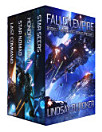Thought X: Fictions and Hypotheticals
এই ইবুকখনৰ বিষয়ে
Science is always telling stories. Whether in the creation myths of evolution or the Big Bang, or in the eureka moments of science history, narrative – just as much as metaphor – is a key tool in the scientist’s surprisingly literary toolkit. Perhaps the most interesting use of story is the thought experiment, the intuition pump, that draws on the most instinctive parts of the imagination to crack otherwise perplexing problems.
From Newton's Bucket, to Maxwell’s Demon, from Einstein's Lift to Schrödinger’s Cat – all are examples of 'fiction' being used at the highest level, not just to explain, but to deduce, to prove. In this unique anthology, authors have collaborated with leading scientists, to bounce literary, human narratives against purely theoretical ones, alloying together real stories with abstract ones, to produce truly extraordinary results.
Full list of thought experiments: The Twin Paradox, The Grandfather Paradox, Maxwell's Demon, Laplace's Demon, Mary's Room, The Chinese Room, Schrödinger's Cat, Galileo's Boat, The Infinite Monkey Typing Pool, Einstein in a LIft, Einstein Chasing a Beam of Light, Newton's Bucket, Olber's Paradox.
মূল্যাংকন আৰু পৰ্যালোচনাসমূহ
লিখকৰ বিষয়ে
Ra is the founder and Editorial Manager of Comma Press. He’s the editor of numerous anthologies, including The City Life Book of Manchester Short Stories (Penguin, 1999), co-editor of The New Uncanny (winner of the Shirley Jackson Award, 2008) and Litmus, voted one of 2011’s books of the year by The Observer. Between 2004 and 2013 he was also the coordinator of Literature Northwest, a support agency for independent publishers in the region (until it formally merged with Comma). He also coordinates Comma Film, an on-going film adaptation project which regularly commissions filmmakers and animators to adapt short literary texts (poems and short stories). He is a former journalist, having been Deputy Editor for City Life magazine, and a former Director of Manchester Poetry Festival. His critical work has been published in The Journal of the Short Story in English, and he’s been a producer, co-writer and co-director on a number of short film projects. He read Physics and Philosophy at Balliol College, Oxford and has an MA in English from the University of Manchester.
Dr Rob Appleby is a Reader of physics at the University of Manchester, a member of the Accelerator Physics group and of the Cockcroft Institute. His primary research interest is the physics of particle accelerators, including the motion of particles and new accelerator concepts, and he has worked for many years on the Large Hadron Collider and particle accelerators for cancer treatment. He holds a PhD in theoretical physics from the University of Manchester and a Masters degree in theoretical physics from the University of York. He has previously been a consultant on Comma’s Litmus and When It Changed anthologies.




